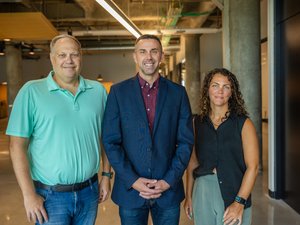Last year was a challenging one for startups nationwide. There were fewer blockbuster headlines celebrating massive fundraises. Exits – when founders or investors sell to larger firms or make public market debuts – were virtually nil in the region. Banks closed and layoffs were a common theme across the tech scene.
In Cincinnati, however, dozens of newly formed companies were building, quietly, in a way that only the Midwest can master. For our sixth annual Startups to Watch list, we introduce you to 24 of them. We think they have outsized potential as we settle into 2024.
These early-stagers (traditionally, companies sitting at a Series B funding or below) have established solid traction – either with fresh capital raises, fast revenue growth, impressive hires or innovative solutions to novel problems. They were flagged by local StartupCincy ecosystem players, venture capitalists and Courier and Cincy Inno staff.
The ideas born from these companies – ranging from life-saving health innovations to artificial intelligence-driven software products – motivate and inspire. Some of our up-and-coming firms want to change their industries, or even the world.
Level 6
Cybersecurity
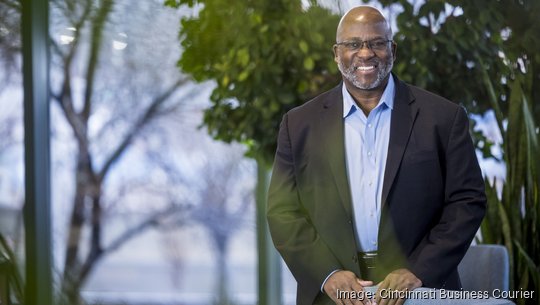
The best founders see a problem in the marketplace and build something to solve it. That’s largely how Kevin Jackson, a veteran chief information security officer, or CISO, dreamed up Mason-based Level 6, launched in 2022. Its product, LISN, is a first-of-its-kind cyber-strategy analytics/business intelligence tool – built for cybersecurity decision makers at organizations big and small. These are people often making decisions based on anything but actual data, he said. Their decisions are siloed.
LISN uses machine learning and AI to gather open-source intelligence from organizations all over the world to deliver customized results: it gathers insight into cybersecurity strategies, what approaches other companies have used, what works and what doesn’t – and at what cost. Leaders can even see where their organization is overspending. Level 6 also takes it a step further. Users can model decisions and strategies before implementation.
“Everyone is constantly having to do more with less,” he said. “Now decision makers can make decisions using data and analytics and charts and graphs. Not random guesses.”
Since its launch, Level 6 has scaled to a 20-person team and has landed a few early adopters, including consumer goods giant Procter & Gamble. Level 6 has also been able to generate a small amount of revenue. Level 6 is targeting a $1 million “seed one” round, and it’s casting a wide net. Last year it pieced together a pre-seed raise from a variety of angels and Bold Ventures, a Buffalo-area venture capital fund. It’s likely a “seed two” will follow this year. That will serve as a significant milestone and headcount boost.
Currently, Level 6 stands alone in terms of competition, but it won’t stay that way for long. There’s newfound government interest, which could prove a game changer. Jackson speaks the lingo – he spent nearly eight years at Booz Allen Hamilton, a government contractor, a major differentiator especially when others follow.
- Liz Engel
Gotara
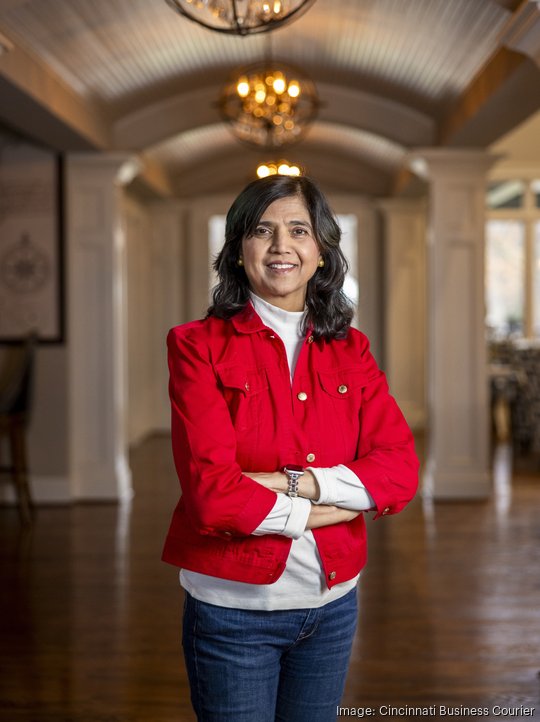
D. Sangeeta left corporate America in 2020 to start Gotara, a startup focused on providing solutions to the high burnout rate of women in STEM+-centric organizations through upskilling, mentoring and coaching.
“We have developed the secret sauce of combining business results with leadership development,” Sangeeta said.
The former Amazon, Nielsen and GE Aerospace executive put around $1.4 million of her own money into the company, which is already turning a profit with a network of 30,000 members in 176 countries. “I wanted to climb the second mountain,” she said. “I want to do what I absolutely love and no matter how hard I work, it will feel fun.”
Gotara is all about growth in 2024. Sangeeta hired two new sales leaders, which rounded her team out to 20 people. She’s also working to boost the company’s marketing and public relations presence. Another major goal for the new year is leveraging generative AI.
- Christian LeDuc
Seam
Technologies
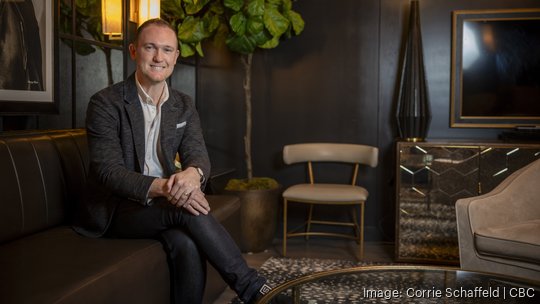
Seam Technologies CEO Jeff Schaeffer was working for a massive Chicago startup when he first noticed the problem his new company, founded in late 2022, is now working to solve. There’s a huge amount of waste in U.S. health care – an estimated $1 trillion each year. Seam’s software platform uses advanced analytics to help hospitals and hospital systems find, fix and measure sources of waste in their operations. It’s targeting mid-sized and large systems where there is enough complexity. Schaeffer said the stakes need to be high enough so that “even a small change can make a big impact.”
“The doors have kind of been blown off in this domain, in a good way,” he said. “It's really exciting to see the new models and technologies available for new applications.”
To start, Seam is narrowing in on nursing workflows. Once it receives validation, it plans to scale and expand to other use cases. The company in July 2023 quietly raised a $4 million seed round from Columbus juggernaut Drive Capital to build its team and product. It has five employees and is looking to hire additional software engineers and data scientists, as well as machine learning and AI engineers. It’s the fourth local company to join the Drive portfolio, including Pieces, Tesouro and Scheduler AI, all previous Startups to Watch honorees.
- Liz Engel
Narratize
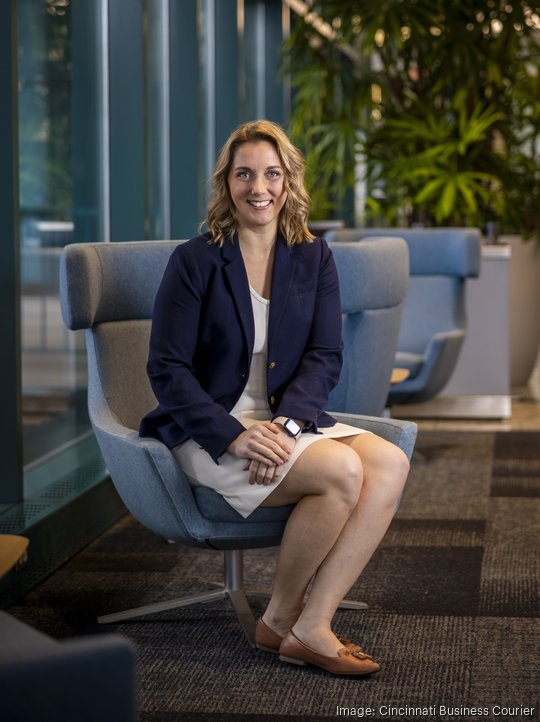
Only 2% of venture capital goes to female-led companies. For those leading AI firms, that percentage drops significantly to 0.3%, said Katie Trauth Taylor, co-founder and CEO of Crescent Springs-based Narratize. The company has developed a generative AI platform designed specifically for scientific, medical and technical writing.
There are many benefits to storytelling, particularly when dealing with complex or innovative topics. Companies can find better message-market fit and adoption. Plus, good storytelling accelerates speed to market. “Your entire enterprise innovates faster,” Taylor said. When it comes to capital, Narratize has broken through in that regard. In December, the startup closed an oversubscribed $2 million seed round led by New York-based HearstLab, which invests in early-stage, women-led startups; and Kubera Venture Capital in San Francisco, with participation locally from Cintrifuse Capital. The company already landed a handful of high-profile partners, including Boeing, the Good Housekeeping Institute and NASA.
- Liz Engel
Carefeed
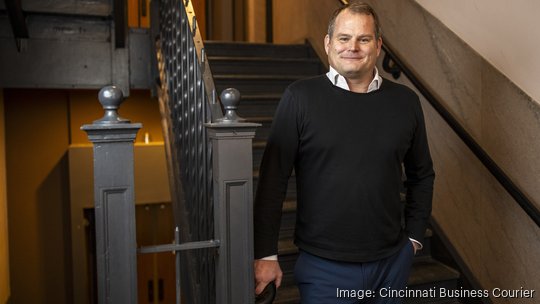
In 2019, Terry Wall came up with idea for Carefeed, a resident and family engagement platform tailored to the senior living sector of the health care industry. “I have eight kids, so the longest sales cycle was to sell my wife on quitting a good job to start a business,” Wall said.
Carefeed saw a boost during the Covid-19 pandemic, and at the end of 2023, the company closed a successful Series A. Thanks to a major investment from a well-known West Coast investor, who Wall wants to remain anonymous, the organization is looking to hire 30 more employees bringing its total staff to 50. Carefeed, which is based in Over-the-Rhine, is also looking to move into a bigger space to accommodate the influx in staffing. In 2024 the company looking to expand its post-acute platform to offer more products. The Carefeed app, too, hit the market.
- Christian LeDuc
Suade
- Matthew Terry started his first company in 2018, quickly realizing he lacked one key skill needed for it to succeed: sales charisma. No mind he had a degree in aerospace engineering. There was a different science involved in getting people to buy in – literally – to his idea. Suade, his latest startup, is a software platform that can guide salespeople through conversions in real time. It uses AI, deep learning and large language models (LLMs) to help teams facilitate “perfect” conversations. The target? Outsourced sales firms – third-party vendors tapped by companies or agencies to handle sales. More than 9,000 exist in the U.S. today. He wants to get at least 10 on the platform in 2024, one of several goals he’s set this year. “The AI boom has helped, because firms are looking for new AI sales tools,” he said. “It’s been easier to get in the door with some customers.” Suade is raising a $1 million round and has had encouraging conversations with several local firms. At least one angel investor has already committed funds: John Stieger, a Procter & Gamble and Cintrifuse alum, now serving as chief of staff at InfoTrust, one of the region’s fastest-growing companies. Stieger has also helped make key connections to potential clients, Terry said.
- Liz Engel
GardenIQ
- The first quarter of 2024 will be pivotal for marketing technology startup GardenIQ. The company, helmed by CEO Dom Shamblee with a C-suite that includes a slew of agency veterans, launched in late 2022. Its platform, which is specifically geared for e-commerce retailers, merchants and marketers, works much like Klaviyo, Mailchimp or Constant Contact – except it goes a few steps further. For one, it’s easier to use, Shamblee said. Most competing platforms require code and/or use of application programming interfaces to integrate with websites or sync data, to leverage them fully. The problem? Most marketers are not coders. That means they need to procure technical resources like developers, or those features simply go unused. GardenIQ offers a no-code solution. But its true differentiator will be its executional AI. The offering has many layers, but it’s all about productivity. “What used to take 80 to 150 clicks inside of an email builder can be a quick conversation with AI through a chat module,” Shamblee said. That segues into the ability to move from mass marketing campaigns – sent in bulk to hundreds or thousands of customers – to tailored, individualized, personal messaging. GardenIQ expects soon to launch its minimum viable product, with a handful of early adopters representing about $1 million in committed revenue. Among those early customers: a Michigan agency that manages websites and performance marketing for 50 beauty brands. Shamblee said all 50 will move over to the GardenIQ platform from Klaviyo. It’s a dream scenario the team hopes to repeat at scale.
- Liz Engel
Todd
- Todd is dedicated to helping individuals and families with estate planning. Co-founders Eron Bucciarelli, Justin Deja and Alois Barreras launched the company in 2023. Bucciarelli’s father, Todd, who started his own estate planning while fighting cancer, is the inspiration behind the product. It’s designed to reduce confusion and streamline what is already an extremely difficult and emotional process. A successful pre-seed round of funding was completed in 2023, which gave the founders the opportunity to dive into the project full time. The goal for 2024 is to launch with distribution partners, including three local firms, which have not yet been disclosed. “We’re going to have hundreds of individual families on our platform over the next four to six weeks,” Deja said. The company is preparing for a bigger launch in the coming months. Toward the end of this year, the company plans on engaging the local investment community to start securing funding heading into 2025.
- Christian LeDuc
RYN
- University of Cincinnati alumna Camryn Ellis started RYN in 2022. The company was born from her own personal struggle with fashion. “I just got so overwhelmed that I was almost in tears, and I felt very silly just picking out an outfit,” she said. She looked for an app to help her, but there was none. So she decided to create it. The app works to showcase individuality, acting as a personal stylist that uses the clothes a user already has to help them quickly reach their wardrobe’s full potential. She’s currently accepting signups for her beta test, which will run within the next few weeks. A public launch is expected at some point in the first quarter. The styling app will be free to download with the opportunity to pay for the premium version. She currently works with three other women on the project and is looking for a technical co-founder to join the team. Ellis, who graduated from UC in August with a bachelor’s degree in international business and entrepreneurship, was a 2023 nominee for Cincy Inno’s Five Under 25 award.
- Christian LeDuc
GearSupply
- The phrase “pivot” certainly gained notoriety during the pandemic. For Findlay Market-based startup GearSupply, it proved more than just a buzzword. The company made a major shift in March 2020. It meant shedding its former life as a brick-and-mortar operation – and cutting eight staffers, about a half of its team, in the process. “It was very scary. But it was what we needed to do,” Mendel Rosenberg, GearSupply CEO and founder, said. “We were trying to become this amazing startup, but we hadn’t really changed the team to operate like one. That reset was the biggest thing we did.” Rosenberg, a Miami, Fla., native, started GearSupply in 2018, albeit under a different name. It bought used audio gear in bulk and relied on a mess of brokers to sell it. It’s now operating as a “21st century” marketplace, buying and selling AV equipment. It also handles payment processing, freight and logistics. These are typically large transactions. A mega tour – like Taylor Swift’s – or major venue – like LA’s Dodgers Stadium – continually turn over equipment. And unlike a cell phone, an amplifier can remain current for 10-15 years. GearSupply expects to close a $4 million raise this quarter, led by a major manufacturer in the industry. The round carries a $15 million valuation, and the company expects to hit $30 million in revenue in 2024.
- Liz Engel
Cooler Keg
- The Cooler Keg team kicked off 2024 with a bang. A partnership with California robotics firm Ottonomy landed them at CES, the world’s largest tech show, where it debuted the Ottobot Brew, an automatic draft beverage robot. The company in 2022 raised $215,000 on crowdfunding platform Indiegogo – $195,000 more than its initial goal – and sits in a “Goldilocks-like” position in the marketplace. Its portable kegerator-like cooler is “just right” in terms of size. While the company is targeting tailgaters and campers, there’s also an appealing B2B play. Ottobot Brew is proof. Still, co-founder Racine Gruberman is bullish on the company’s original plan. There’s an allure that comes with chasing shiny objects, but that can be a No. 1 pitfall for startups at this early stage. “We know we can’t do everything well,” she said. “As a company, especially as a startup, we have to make sure we’re focused on doing the basics.” Following months – and months and months – of production delays, Cooler Keg finally has product in-hand. Its first major shipment of coolers – priced at $949.99 – arrived in January.
- Liz Engel
Conductor Solar
- Software startup Conductor Solar is looking to better connect solar developers with financing partners. Developers can price projects automatically and receive bids from multiple investors. Its platform streamlines the process of completing the transaction. Founder and CEO Marc Palmer said the goal is to simplify a complicated process, thus getting more projects off the ground. He’s a vet in the industry, drawn to the renewable energy sector because of its growth and importance. Conductor Solar launched in 2021. The company is co-located in Cincinnati and Athens, Ohio. “We can be a key cog in this whole ecosystem,” he said. Conductor Solar has helped close around $15 million worth of solar builds, including a handful in Ohio, with a half a billion in projects submitted last year; its revenue comes from success fees, or when a project is built. It has more than 200 developers on its platform and is working to add more financing options to the mix. The company is in the midst of a $1.2 million seed round and has raised roughly $820,000 toward that goal, with participation from Ohio Impact Fund, among others. The industry is facing “huge tailwinds,” Palmer said, driven largely by President Joe Biden’s Inflation Reduction Act, considered the most significant climate legislation in U.S. history.
- Liz Engel
Preservation Bio
- Preservation Bio aims to transform a $4 billion global market – for blood platelets. It’s an industry in which growth is hampered by inefficiencies related to shelf life, storage and shipping. Unlike red blood products, platelets are currently stored at room temperature because they do not tolerate refrigeration. Preservation Bio is developing a novel approach to preserve them – allowing donations to survive at refrigeration temperatures for up to 14 days, more than doubling shelf life. In September 2023, the startup was awarded a $2.05 million Small Business Innovation Research grant from the National Heart, Lung and Blood Institute, which sits under the National Institutes of Health. For 2024, the company will look to move its lead candidate, SG04, into the clinic. This milestone will be marked by the start of a first-in-human clinical trial. “We believe by enabling safe refrigeration of donated platelets, (we have) the potential to transform the way these blood products are stored and used, offering enhanced patient care while addressing a significant and untapped commercial market,” CEO Rich Ganz said. Ganz is also a senior venture partner at Orange Grove Bio, a drug investment and development firm that relocated its HQ from New York to Cincinnati in late 2021. Preservation Bio is among Orange Grove’s growing number of portfolio firms.
- Liz Engel
Serif Health
- A new federal law requires all hospitals and insurance carriers publish pre-negotiated rates to the public. What does that mean for employers, health plans and providers? Enter Serif Health. The startup aggregates and normalizes the data and puts it into an effective, searchable and filterable digital warehouse for anyone to view. “Historically, that information has been very protected and very hard to get,” said Chief Technical Officer and co-founder Matthew Robben. “Our mission as a company is to just make that. Simple, straightforward and easy to obtain.” This year will be pivotal. Serif has more than 60 clients and will double down on growing its customer base. Robben said 2024 is all about getting the data clean. He’s also looking to grow the team. The company is researching how it can use artificial intelligence and machine learning to streamline its processes. Serif Health successfully executed a $3 million seed fundraise in 2022 and is looking to potentially launch a Series A in 2024.
- Christian LeDuc
Tembo
- Serial founder Ry Walker didn’t wait long to launch his newest venture after exiting Cincinnati unicorn Astronomer in 2022. Tembo, formerly known as CoreDB, is a commercial open-source platform based on the popular database Postgres. Many enterprises and organizations have adopted Postgres for their database needs, and Tembo is on a mission to make its use more accessible and available to all. Walker called it a $70 billion market opportunity and counting. Tembo raised $7 million last year – backers include Fireroad, a new venture fund; and CincyTech, one of the Midwest’s most active seed-stage firms. It recently launched a new website – formally bringing it out of stealth mode – with multiple new extensions.
- Liz Engel
Finopsly
- Finopsly is still in super stealth mode – at least two of its founders are area Fortune 500 veterans – but its offering could prove a game-changer for firms looking to save money in this era of digital transformation. Companies continue to grow their cloud footprint, and as such, their costs to maintain such remote infrastructure also is increasing. Finopsly is building a copilot product for financial operations, or FinOps. Its platform aims to reduce cloud spending by more than 32%, while also ensuring cloud investments are sustainable, optimized and efficient. Lingo aside, the fruition of a key fundraise this year could move those efforts into the public spotlight.
- Liz Engel
0.Engineering
- 0.Engineering, led by co-founder and CEO and Cincinnati transplant Kiet Ho, allows for collaboration between front-end designers and back-end engineers – saving hours of wasted time. Using 0.Engineering’s Chrome extension or browser-wrapping interface, designers can create or change design elements that reflect code changes directly into an existing codebase, allowing designers to contribute and publish without engineering experience. At last count, the company had more than 600 users on its waitlist. It’s currently beta testing its version one. The company was one of five selected for GBeta Cincy fall 2023 cohort, an equity-free accelerator program for early-stage startups.
- Liz Engel
Fynancial
- Fynancial is the world’s first social financial platform. The Covington-based startup, launched by former adviser Tom Fields in early 2022, offers a white-labeled app for registered investment advisers. It features traditional wealth management tools but also more modern social engagement features (like scrolling, push notifications and in-app messaging). It’s proving popular amongst millennials and Gen Zers. Fidelity caught wind of the platform and now refers it business, Fields said. The firm’s interest is huge, and not just for new business. “It’s credibility,” Fields said. “This is a small world. If you take care of your clients, and you get great partnerships in place like a Fidelity, word can spread quickly.” Fynancial recently closed a nearly $1 million round – largely funded by its current clients, an unusual route but one that keeps its cap table, or equity ownership, clean. It carries a $10 million valuation. It also added a key strategic adviser in Aaron Klein, former CEO and co-founder of adviser and wealth management platform Nitrogen Wealth, formerly Riskalyze. Riskalyze, in 2021, sold to London-based private equity firm Hg in a deal valued at more than $300 million. Klein brings invaluable influence and social perspective, Fields said.
- Liz Engel
Common Kin
- Common Kin launched during the pandemic, a time when most people were stuck in their homes. Its first patented product, Swivel, a kitchen storage organizer for small spaces, has the ability to house 10 cookware items within 1 square foot on the countertop. The company has created a functional prototype, which will lead to a production run – depending on the success of its Kickstarter campaign. The startup is targeting up to $300,000 to scale.
- Christian LeDuc
Capp-In
- Miami University students Whitley Calder, Anna Gioia, Emily Rake, Greg Sedlack and Ashley Underwood developed Capp-In, a 5-by-5-inch detachable wallet that fits inside any hat and serves as a built-in pocket for credit cards, cash, IDs, even house keys. The wallets are lined with RFID padding to shield sensitive data – protection from hackers is an area of growing concern especially at large stadiums, especially those with clear bag policies. The wallet also offers runners, golfers and other outdoorsmen a hands-free experience (plus it’s washable). The company took first place in the RedHawk Venture pitch competition in December, a program offered by Miam’s student-led venture fund. The team received $5,000 for its efforts and plans to continue pursuing the idea. A patent is a possible next step.
- Liz Engel
Tensure Tech Consulting
- Tensure Tech Consulting, founded in 2020, was born to provide freedom to its clients. The company, led by Justin Billig, Dan Rye, Doug Shannon and Matt Young, while still young, has experienced explosive growth. It works with everyone from startups to large enterprises, like Mailchimp, with millions of customers to help brands optimize data pipelines, gain real-time visibility, manage cloud costs and automate manual data processes. In essence, it offers a range of tech solutions that solve problems, giving clients freedom to spend more time on other, maybe more valuable, work.
- Christian LeDuc
Beltways
- Brothers John and Matine Yuksel left their lucrative careers in law and tech in 2020 to start Beltways with the goal of bringing their father’s invention to life. In 1976, Edip Yuksel invented the modular and pit-less accelerating walkway during his freshman year at METU in Turkey. Today, his two sons are carrying on his legacy. “The tagline is we’re building the world’s fastest, smartest and safest moving walkways,” John Yuksel said. Beltways moved to the Cincinnati area in 2022, and at the end of 2023, the company moved into a new 20,000-square-foot facility near the Cincinnati/Northern Kentucky International Airport. The company recently closed a seed round and is actively engaging potential Series A investors with the hopes of starting a fundraise at some point in Q3. The brothers are looking to grow their team by hiring engineers and mechanics. In 2023, Beltways won OhioXcelerate and the Cincy’s Got Startups pitch competitions.
- Christian LeDuc
PlaneKrafty
- Nicole Dyehouse formed PlaneKrafty in 2023. An airplane mechanic with two decades in the industry, she started the company to help fill a gap when it comes to the organization of maintenance records. “Having a reliable and easy system to organize and maintain your records is critical to safety, reduces cost and improves the value of an aircraft,” Dyehouse said. This year, PlaneKrafty plans to have a fully functioning minimal viable product and roll out an application in Q3 to be presented at the National Business Aviation Association conference. Dyehouse is also actively recruiting tech developers.
- Christian LeDuc
Optimvia
- Biopharma company Optimvia specializes in engineering enzymes and their cofactors to synthesize complex therapeutic molecules. The company is led by CEO and Chair Keith Kleeman, an experienced health care and pharmaceutical industry executive and former CEO and founder of Cincinnati-based medical writing firm Medical Communication Consultants. The company’s technology allows heparin, a life-saving blood thinner used to prevent clots, to be produced in sterile lab settings instead of slaughterhouses. Heparin is currently produced by scraping the mucosal lining from pig intestines. More than 350 million pigs are needed to support the global demand of 100 metric tons of heparin. A recent SEC filing shows a $5 million funding round is in progress.
- Christian LeDuc




